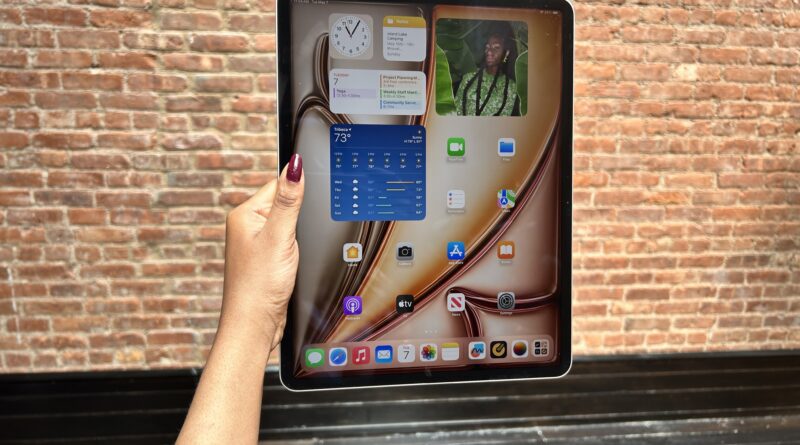2024 iPad Air hands-on: Call me greedy, but I want more

After feasting my eyes on the thinnest-ever iPad Pro, which drew me in with its vivid, color-rich, ultra-bright OLED display, the new M2 iPad Air looked like the plain Jane sibling.
The iPad Pro had me looking like Jim Carrey’s jaw-dropping character in The Mask while the iPad Air, well, just got an indifferent nod from me.
For some time, the rumor mill claimed that the iPad Air would sport miniLED, borrowing a display perk from the previous-generation 2022 iPad Pro. This incited a little bit of excitement in me. But then, last minute, another rumor shot that down, claiming that miniLED isn’t coming to the iPad Air.
As it turns out, it’s true. The iPad Air still sports its predecessor’s LCD display. Darn!
On the plus side, the iPad Air still comes with some worthy upgrades that may lure Apple enthusiasts into its lair.
Webcam got moved
If you’ve ever used an iPad Air on the Magic Keyboard, you may have noticed that the webcam, situated on the top bezel, sits on the side because of the landscape orientation. As such, video conferencing and FaceTime sessions may have felt a little awkward. (After all, we’re all used to having webcams sitting on the top frame of our devices.)

That’s why Apple moved the webcam to the side bezel, ensuring that the 12MP webcam is on top during video calls. There’s still no FaceID, though.
New 13-inch model
When I tried working with the iPad Air for week, I thought it felt a little cramped. While some may love the portability of a 10.9-inch display, I thought, “Some extra screen real estate wouldn’t hurt.”

So when I saw the new iPad Air entrant, the 13-inch model (matching the size of the largest iPad Pro), I was like, “Ooh! This size is just right.” Apple said that the 13-inch iPad Air has 30% more screen real estate compared to its predecessor, and yeah, the uptick in spaciousness is unmistakable.
If you don’t have a workflow that is intensive on the internals, and you’re not affected by the limitations of iPadOS, you can pop this bad boy on a Magic Keyboard for a more comfortable, laptop-esque experience. (Plus, the new Magic Keyboard now has a full function row and a larger haptic trackpad.)
The iPad Air comes in 11-inch and 13-inch models now, but the latter is the showstopper here.
iPad Pro stole its shine
If the iPad Air were chilling on its own, I would have been impressed (particularly with the spacious 13-inch model). However, with the iPad Air sitting next to the iPad Pro, it was easy to see the conspicuous differences in their displays.
After all, you’re shelling out less cash, $ 599 to start via the official Apple Store, which is a wallet-friendly price tag (for Apple, anyway), but this comes with trade-offs.

One of those trade-offs is a dimmer screen.

Brightness ranges from 500 to 600 nits; compare that to the iPad Pro, which delivers a peak brightness of 1,600 nits.
That being said, if you don’t mind splurging, I highly recommend the iPad Pro, particularly if you plan on using this tablet on-the-go. If you’ll be using your iPad indoors, however, and you don’t sit next to a bright window, the iPad Air should suffice.
It’s also worth noting that the iPad Air comes with an M2 chip, the same processor that’s inside the 15-inch M2 MacBook Air I’m currently using to type this hands-on review. And during the demo, I saw the M2 chip handle processes like Photomator’s “ML Enhance” and “Super Resolution” better than ever, where I saw a photo go from ho-hum to vividly striking in just seconds.
The iPad Air, particularly the 13-inch model, caught my eye, but next to the iPad Pro, the Air is struggling to stand out.
The iPad Air starts at $ 699 while the iPad Pro starts at $ 999.



